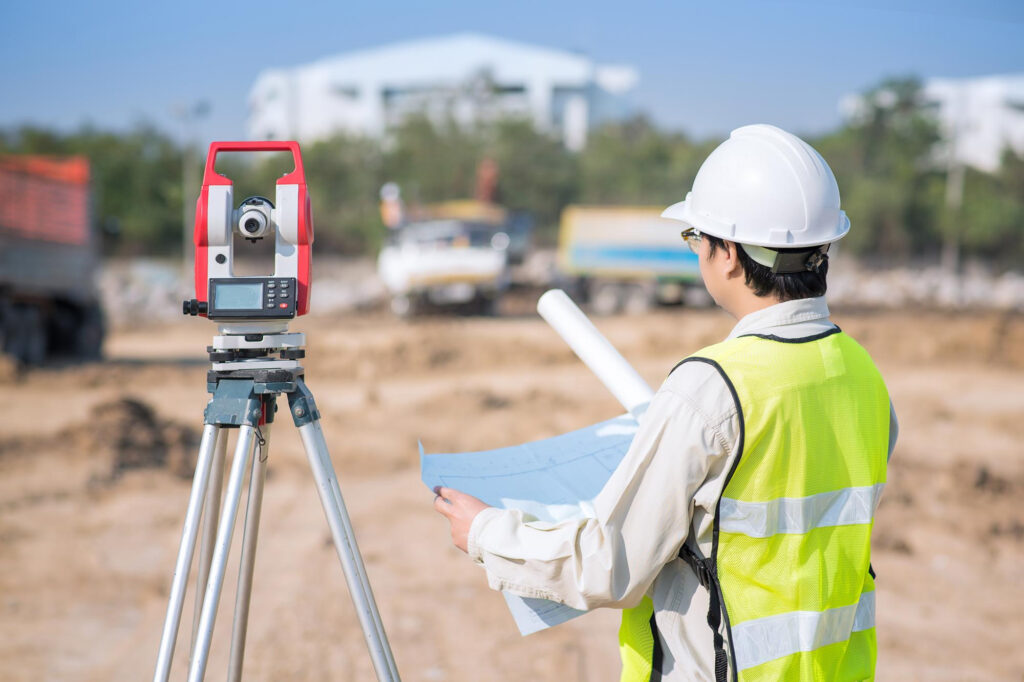Site surveying is one of the most important stages in any project of building or development. It involves the literal mathematical determination and mapping of terrain to understand its limitations and characteristics. Various problems and delays would be imminent in construction projects should a proper site survey not be conducted. As far as the effective and safe utilization of the land is concerned, this post will help the engineers, architects, and constructors to make proper decisions.
The Understanding of Site Surveying Basics
A plot of land is surveyed in a process called site surveying before any building work commences. To obtain precise measurements of the landscape, the qualified surveyors are outfitted with specialized equipment. In addition to scouting the ground’s topography and determining property boundaries, they look for any difficulties or impediments that might have an impact on construction design. It is due to such comprehensive analysis that the people involved in the project understand the situation better.
It entails taking accurate measurements of the land’s height, angle, and distance.Surveyors create in-depth maps and drawings that can identify the exact positions of everything. All future planning and construction projects are built on these maps. Lack of such knowledge would mean that builders are functioning blindly, which would lead to expensive complications and the most serious mistakes.
Primary objectives of field-surveying operations
Site surveying is basically aimed at getting precise data about a given piece of land prior to building on it. This information also avoids costly mistakes since buildings are known to be made at the right points. The surveyors verify the precise borders of the land to ensure that the building is within the legal bounds. They also determine the elevations of the land and slopes, which are used to help an engineer solve drainage and foundation designs accordingly.
Another important objective is to assess the natural features of the land, its utilities, and built-in infrastructure. Identifying underground pipelines, power lines, trees, rocks, and other forms of encumbrance that would pose a threat to the proposed construction is part of this. Awareness of these properties in advance will allow the builders to adjust their plans or plan around them.
One of the most important aspects of site surveying work is safety. Surveyors identify potential hazards that may arise during the construction process, including steep slopes, unstable terrains, or flood issues. They provide engineers and construction workers with such data to enable them to develop structures that can last a long time and be secure.
The Role of Site Surveying in the Scheduling of Buildings
Surveying the site is essential in the early phases of development planning. Engineers cannot plan infrastructure, and architects cannot design buildings, before they get accurate land information. Thanks to survey information, they will be able to plan according to their knowledge of the natural features of the site. The location of buildings, the foundation structure, and the installation of utilities can be decided on through this knowledge.
The results of the survey are also helpful in the selection of the best approach towards building projects. Construction may be easy provided that the land is solid and flat. However, in case the survey reveals the presence of certain issues such as rocky ground, steep hills, or poor drainage, the construction crew will be forced to think of solutions. It economises time as well as money during the actual building process because the pre-planning is done.
Besides, a survey of sites helps obtain any needed approvals and permissions from the local authorities. To approve of constructions, governmental organizations require accurate survey information. This will ensure that new buildings conform to the municipal laws and regulations concerning setback regulations, property boundaries, and environmental conservation.
Technology and Contemporary Site Inspection
To ensure better accuracy and efficiency, modern site surveying uses high-level technologies. Computers and global positioning systems have all made the gathering and analysis of data much easier for surveyors. These instruments will make it possible to collect data faster with the required high accuracy in building projects.
Second, drones are also being used more and more for site surveys. Through the assistance of drones, surveyors are able to form a more accurate idea of the broad structure of a place because they can quickly cover wider and generalised spaces and derive detailed aerial images. The traditional survey-related equipment may not be simple or time-consuming to provide an alternative in big or inaccessible locations, yet the technology may be of use, particularly there.
Final survey reports are more accurate when site surveying in Dubai uses modern technologies. Digital maps and 3D models help architects and engineers visualize the site more clearly, leading to better design decisions and greater success in construction projects.
The Long-Term Benefits of Expert Site Surveying
The benefits of hiring a qualified site surveyor go well beyond the earliest stages of development. When survey data is accurate, it produces a permanent record of the property that may be utilized for maintenance, future additions, and changes. Throughout the building or development’s lifetime, this information is still useful.
Proper site surveying also helps shield property owners from future lawsuits over development or boundary conflicts. If disputes or difficulties develop years after construction is finished, having thorough, expert survey records provides solid proof.
The comprehensive information obtained through surveying the site is also helpful in making decisions regarding future planning and development. Based on such information, owners of the properties will be able to determine whether to make additions to their property, upgrades, or other changes. For any building project, professional surveying is a prudent investment due to its continuous value.
Conclusion:
For development and construction projects to be successful, site surveying is a prerequisite. In order to make informed judgments on land use, design, and construction techniques, it offers precise information. Expert site surveying ensures that construction work goes easily and safely, whether for modest residential projects or huge commercial ventures.
In today’s building sector, the significance of site surveying cannot be emphasized enough. In addition to saving time and money, it avoids difficulties that would otherwise result in major delays or safety concerns. Successful projects in difficult environments, such as Dubai, require expert site surveying.
Building companies and real estate developers position themselves for success by investing in high-quality site surveying work. Sophisticated surveyors’ professional knowledge and thorough information serve as the cornerstone for safe, effective, and prosperous building projects that will benefit their communities for many years to come.



